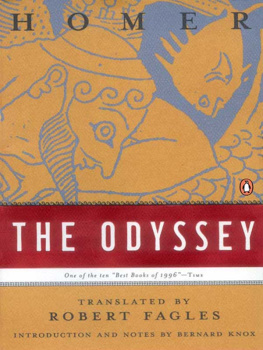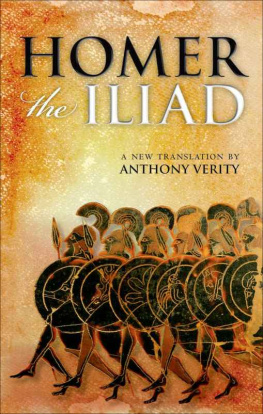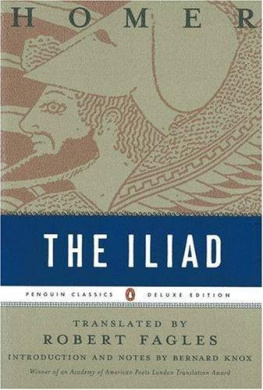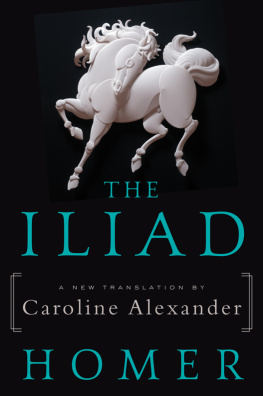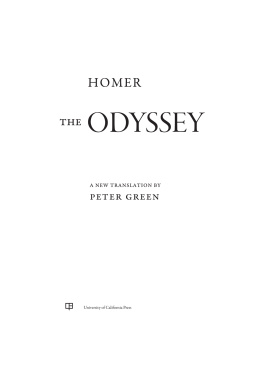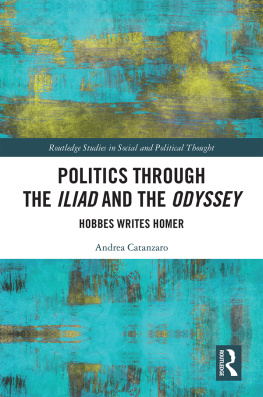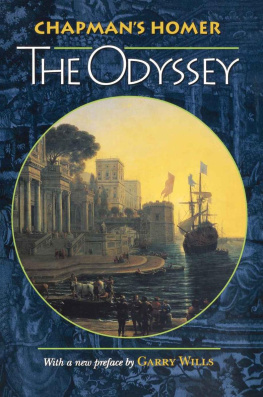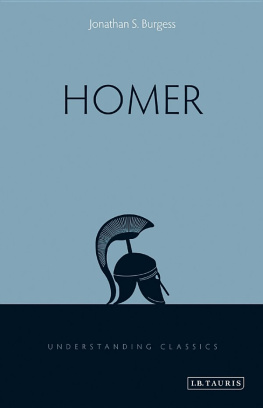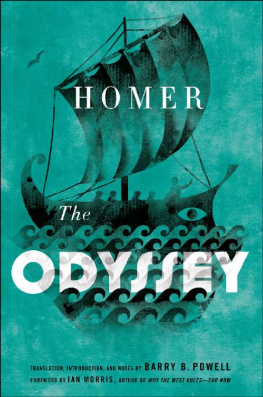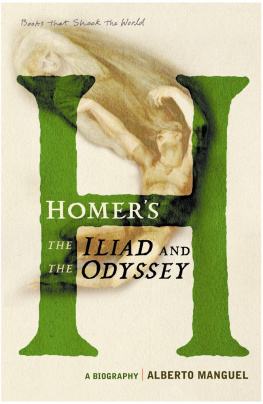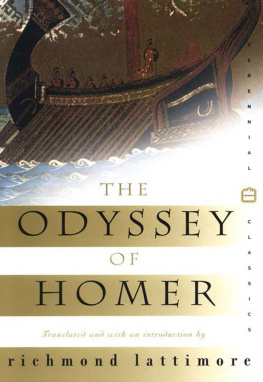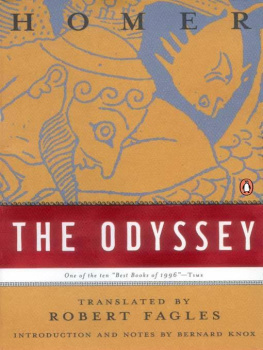Homer - The Odyssey
Here you can read online Homer - The Odyssey full text of the book (entire story) in english for free. Download pdf and epub, get meaning, cover and reviews about this ebook. year: 2011, publisher: Penguin Books, genre: Romance novel. Description of the work, (preface) as well as reviews are available. Best literature library LitArk.com created for fans of good reading and offers a wide selection of genres:
Romance novel
Science fiction
Adventure
Detective
Science
History
Home and family
Prose
Art
Politics
Computer
Non-fiction
Religion
Business
Children
Humor
Choose a favorite category and find really read worthwhile books. Enjoy immersion in the world of imagination, feel the emotions of the characters or learn something new for yourself, make an fascinating discovery.
- Book:The Odyssey
- Author:
- Publisher:Penguin Books
- Genre:
- Year:2011
- Rating:3 / 5
- Favourites:Add to favourites
- Your mark:
- 60
- 1
- 2
- 3
- 4
- 5
The Odyssey: summary, description and annotation
We offer to read an annotation, description, summary or preface (depends on what the author of the book "The Odyssey" wrote himself). If you haven't found the necessary information about the book — write in the comments, we will try to find it.
Homer: author's other books
Who wrote The Odyssey? Find out the surname, the name of the author of the book and a list of all author's works by series.
The Odyssey — read online for free the complete book (whole text) full work
Below is the text of the book, divided by pages. System saving the place of the last page read, allows you to conveniently read the book "The Odyssey" online for free, without having to search again every time where you left off. Put a bookmark, and you can go to the page where you finished reading at any time.
Font size:
Interval:
Bookmark:
PENGUIN BOOKS Published by the Penguin Group: Penguin Books Ltd, 80 Strand, London WC2R 0RL, England Penguin Putnam Inc., 375 Hudson Street, New York, New York 10014, USA Penguin Books Australia Ltd, Ringwood, Victoria, Australia Penguin Books Canada Ltd, 10 Alcorn Avenue, Toronto, Ontario, Canada M4V 3B2 Penguin Books India (P) Ltd, 11 Community Centre, Panchsheel Park, New Delhi - 110 017, India Penguin Books (NZ) Ltd, Cnr Rosedale and Airborne Roads, Albany, Auckland, New Zealand Penguin Books (South Africa) (Pty) Ltd, 5 Watkins Street, Denver Ext 4, Johannesburg 2094, South Africa Penguin Books Ltd, Registered Offices: 80 Strand, WC2R 0RL First published 1996 Published as electronic edition 2002 Copyright Robert Fagles, 2002 All rights reserved The moral right of the author(s) has been asserted Making or distributing electronic copies of this book constitutes copyright infringement and could subject the infringer to civil and/or criminal liability, where applicable. No part of this book may be reproduced by any means without the prior written permission of the publisher. All rights reserved. ISBN 978-1-1012-2184-6 PENGUIN BOOKS 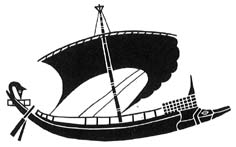 HOMER The
HOMER The
Odyssey TRANSLATED BY
Robert Fagles INTRODUCTION AND
NOTES BY
BERNARD KNOX  For Lynne
For Lynne
su gar mebisao, kour
The Greek philosopher Aristotle, writing in the fourth century B.C ., gives us, in his treatise known as the Poetics, what he considers the essence of the plot. A certain man has been abroad many years; he is alone, and the god Poseidon keeps a hostile eye on him. At home the situation is that suitors for his wifes hand are draining his resources and plotting to kill his son. Then, after suffering storm and shipwreck, he comes home, makes himself known, attacks the suitors: he survives and they are destroyed. This terse summary is the armature of an epic poem that consists of 12,109 lines of hexameter verse composed, probably, late in the eighth century B.C . or early in the seventh, by a poet known to later ages as Homer, for whose life and activities no trustworthy information has come down to us.
The poem, in other words, is some 2,700 years old. How, the reader may well ask, did it survive through such an expanse of time? By whom, for whom, and how and in what circumstances was it composed? Perhaps the best way to proceed to an exploration of these questions (no one can promise a complete and certain answer) is backward from the text of this book. It is a translation, by Robert Fagles, of the Greek text edited by David Monro and Thomas Allen, first published in 1908 by the Oxford University Press. This two-volume edition is printed in a Greek type, complete with lower- and uppercase letters, breathings and accents, that is based on the elegant handwriting of Richard Porson, an early-nineteenth-century scholar of great brilliance, who was also an incurable alcoholic as well as a caustic wit. This was of course not the first font of Greek type; in fact, the first printed edition of Homer, issued in Florence in 1488, was composed in type that imitated contemporary Greek handwriting, with all its complicated ligatures and abbreviations. Early printers tried to make their books look like handwritten manuscripts because in scholarly circles printed books were regarded as vulgar and inferior products cheap paperbacks, so to speak.
Back to 1488, then, there is a continuous history of the printed text of Homer, differing a little from one editor to another but essentially fixed. Before that, Homer existed only as a handwritten book. Such handwritten copies had been in circulation in Italy for a hundred years or so before the first printed edition. Petrarch had tried to learn Greek but gave up; Boccaccio succeeded and also, in 1360, had a chair of Greek founded in Florence. But before Petrarch, Dante, though he put Homer in his limbo of non-Christian poets, had never read him, and could not have read him even if he had seen a text. For the best part of a thousand years, since the end of the Roman Empire, the knowledge of Greek had been almost lost in Western Europe.
In the fourteenth century it was reintroduced into Italy from Byzantium, where a Greek-speaking Christian empire had maintained itself ever since Constantine made the city the capital of the eastern half of the Roman Empire. The knowledge of Greek and the manuscripts of the Greek classics, Homer included, came to Italy just in time; in May 1453 Byzantium fell to the Ottoman Turks, and the Greek empire of the East came to the end of its thousand-year career. During its long life it had carefully preserved, copied and recopied a select number of the Greek masterpieces of pre-Christian times, Homer prominent among them. The immediate predecessors of the printed edition of Florence were bound manuscript books written on vellum or on paper in a cursive minuscule script complete with accents and breathings. These books were the final phase of the process of copying by hand that went all the way back to the ancient world. The new minuscule handwriting had been adopted in the ninth century; since it separated words, it was easier to read than its predecessor, a hand consisting of freestanding capital letters without word division the standard writing of the ancient world.
In the second to fifth centuries A.D ., the form and material of the books had changed: parchment, with its longer life, had replaced papyrus, and the codex form, our book form folded quires of paper sewn at the back had replaced the roll. In the ancient world, the Iliad consisted of a number of papyrus rolls, the text written in columns on the inside surface. The rolls could not be too big (or they would break when opened for reading); a long poem like the Odyssey might require as many as twenty-four in fact, it is possible that the so-called books of our text represent an original division into papyrus rolls. In this form the poem was known to the scholars who edited and wrote commentaries on it in Alexandria, the city founded by Alexander before he set out on his epic march to India in the late fourth century B.C . And it was in this form though, before the Alexandrian scholars made a standard edition, with many variations from one text to another that copies were to be found all over the Greek world of the fourth and fifth centuries B.C . There must have been texts in circulation in the sixth century too, for we hear of official recitations at Athens and find echoes of Homer in sixth-century poets.
By the seventh century B.C. , we are moving back into the dark. In the poets of this century (whose work survives only in fragments) there are epithets, phrases and even half-lines that are also common in Homer. Though these poets Tyrtaeus, Callinus, Alcman and Archilochus may be using tags common to a general epic tradition, it seems more likely that these echoes betray acquaintance with the work we know as Homers. There is also a vase, discovered on the island of Ischia, off the coast of Naples, and dated to before 700 B.C ., which has an inscription that seems to refer to the famous cup of Nestor described in the
Font size:
Interval:
Bookmark:
Similar books «The Odyssey»
Look at similar books to The Odyssey. We have selected literature similar in name and meaning in the hope of providing readers with more options to find new, interesting, not yet read works.
Discussion, reviews of the book The Odyssey and just readers' own opinions. Leave your comments, write what you think about the work, its meaning or the main characters. Specify what exactly you liked and what you didn't like, and why you think so.

